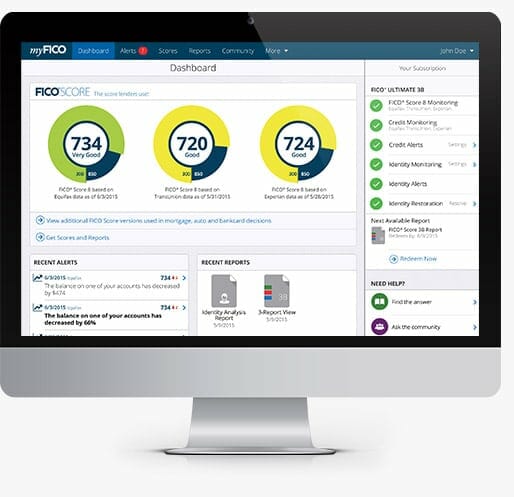Editorial Note: We earn a commission from partner links on Doughroller. Commissions do not affect our authors’ or editors’ opinions or evaluations. Learn more here.
After falling for decades, mortgage rates have risen significantly over the past year. Granted, it’s still nowhere near the 15% or more consumers paid on 30-year, fixed-rate mortgages in the early 1980s. But, still, it’s important to get the best mortgage rate you possibly can. So that’s what we’ll dive into here.
What Determines Your Mortgage Rate?
Several factors will determine the interest rate you get on a mortgage:
- The FICO credit score of each borrower
- The price of the home and amount of the mortgage
- Property location
- The amount of your down payment
- Loan term (e.g., 15-year vs. 30-year)
- Type of interest rate (e.g., fixed vs. variable)
- Loan type
(Source: CFPB). To this I’d add one more factor: your lender.
Let’s take a look at each of these factors and what it takes to qualify for the best mortgage rates.
1. FICO Credit Score
Improving your credit score is the single best way to save money on every type of financing–from home loans to car loans and even car insurance. With a mortgage, a good credit score can easily save you tens of thousands of dollars over the life of the loan. The best mortgage rates go to those with a FICO score of 760 or better.
What do you need to do to improve your score? Start taking these steps right away:
- Pay all your bills on time every month. If you have any late payment records, ask for goodwill adjustments to have them removed from your credit report.
- Pay down your revolving debts. The less revolving debt–like credit card debt–you carry, the higher your credit score will be.
- Don’t apply for too much new credit. Applying for lots of credit will ding your score, so keep this to a minimum, especially right before applying for a mortgage.
These are the three main tips for improving your credit score. But you can check out this longer list of tips for more details.
If you’re great at making your monthly payments on time, be sure to sign up for Experian Boost™. This is a faster way to get your credit score up. When you pay your utility bill or your cell phone bill on time, your FICO® Score may see a boost. The best part is it’s free to use!
Learn More: Read our Experian Boost Review
If you don’t know your FICO score, there are several ways to get it. First, you can buy access to your score directly from myFICO. It’s not expensive and you get your FICO score from all three credit bureaus. Since each bureau’s credit report can look slightly different, this can give you a better picture of what potential lenders will actually see.

If you don’t want to pay for your score, many credit card issuers also offer free access. You’ll find a credit card list that offers credit score access here.
Finally, you can get free access to credit scores through sites like Credit Karma. The score is not based on the FICO formula. But it does a good job of replicating the FICO score. It also provides great information on ways to improve your score. And as I mentioned, it’s free.
It can be a good idea to start with the free options if you’re not yet ready to apply for a mortgage. But before applying, consider paying FICO for your actual credit scores and reports. That way, you can spot any potential last-minute issues in detail.
2. Home Price and Mortgage Amount
The cost of the home and the amount financed also affect mortgage rates. Here, mortgage loans fall primarily into one of three categories (Source: FreddieMac):
- Conforming: These are loans of $766,550 or less.
- Super Conforming: For those who live in certain expensive areas of the country, mortgage loans can go up to $1,149,825 for a single unit and still qualify as super-conforming.
- Jumbo: Mortgages that exceed the limits of Conforming and Super Conforming.
The key here is that, all other things being equal, a conforming loan will have a lower rate than a super-conforming loan. And a super-conforming loan will have a lower rate than a jumbo mortgage.
Using our mortgage rate tool, I found that the difference between a conforming mortgage and a jumbo was nearly 50 basis points.
Bottom line: Opt for a conforming loan if you want the lowest possible mortgage interest rate. If you live in a particularly expensive area, you may need a superconforming loan instead.
3. Property Location
As noted above, expensive areas of the country will qualify for super-conforming mortgages. In those cases, the rates will be lower than if the mortgages were jumbo loans. Buying in a rural area can also uniquely impact your loan options. Shop around for mortgages to see what different lenders will offer for your area of the country.
4. Down Payment
Lenders like not to take risks as much as possible. The more risk you make them take, the more interest they’ll charge to mitigate their potential losses. If you have more equity in the home upfront, your interest rate will be lower.
Think about it: You buy a home and then default on the loan a year later. Is the lender more likely to get their money back if you put 5 percent down or 20 percent down? A bigger down payment means the lender is more likely to get their money back during a foreclosure sale if you default on the loan.
While you can still get loans with less than 20 percent down, this is a good marker to try to reach. Otherwise, you’ll pay higher interest rates and private mortgage insurance (PMI).
5. Loan Terms
Again, lenders typically give you a lower interest rate when mitigating their risks. So, a shorter loan term will generally cut your interest rate–often significantly. You may pay much less interest on a 15-year note versus a 30-year mortgage, though you’ll get a higher payment in return.
Interest rate isn’t the only factor you should consider when deciding between a 15- and a 30-year mortgage. But it’s one important one.
6. Fixed vs. Variable Rate Mortgages
Whether the interest rate is fixed or variable affects the rate. All other things being equal, a variable rate mortgage will start with a lower rate than a fixed rate mortgage. Remember that a variable rate mortgage will go up in a rising-rate environment. And if rates rise significantly, so could your payment.
Adjustable-rate mortgages can be another way to take advantage of low rates. Typically an option like a 5-1 ARM, where your rate is fixed for five years and then varies annually after that, will start out with a lower interest rate upfront. But, again, in a rising-rate environment, your interest rate and payment will rise, too.
7. Type of Mortgage
There are many different types of mortgage products. In addition to commercially available mortgage products, there are VA, FHA, and USDA loans. Each of these mortgage products comes with unique terms and requirements. The mortgage rate also varies from one product to the next.
Some of these programs are built specifically for low-income home buyers. In these cases, you have to meet strict income requirements. But in exchange, you could lock in a below-market-rate interest rate or even a longer term.
If you don’t meet the income qualifications, it may be best to go with a conventional loan. Loans like the FHA 30-year mortgage can have weird additional costs. For instance, the FHA loan charges PMI for the life of the loan. (Most loans are set up to get rid of PMI after you have built up 20 percent equity in the home.)
So, Who Gets the Best Rates?
So, looking at all these categories, what must you do to get the absolute best available mortgage rate? Meet these qualifications:
- Have an 800+ credit score
- Take out a loan of less than $424,000.
- Live in a relatively affordable area, but not one that needs special mortgage considerations.
- Put at least 20 percent down.
- Opt for a 15-year loan.
- Choose a variable interest rate.
- Go with a conventional loan, unless you qualify for a specialized program with a lower rate.
Not many borrowers are going to check all these boxes. And, honestly, not all of these are in your control. And they may not make an appreciable difference, anyway.
So the best option is to:
- Improve your credit score as much as possible.
- Buy an affordable home.
- Save up a 20 percent down payment.
- Choose the loan product that works best for you.
There’s no magic formula here. Lenders just want to give loans to those who are least risky. So make yourself look more attractive to lenders, and they’ll reward you with a lower interest rate.


